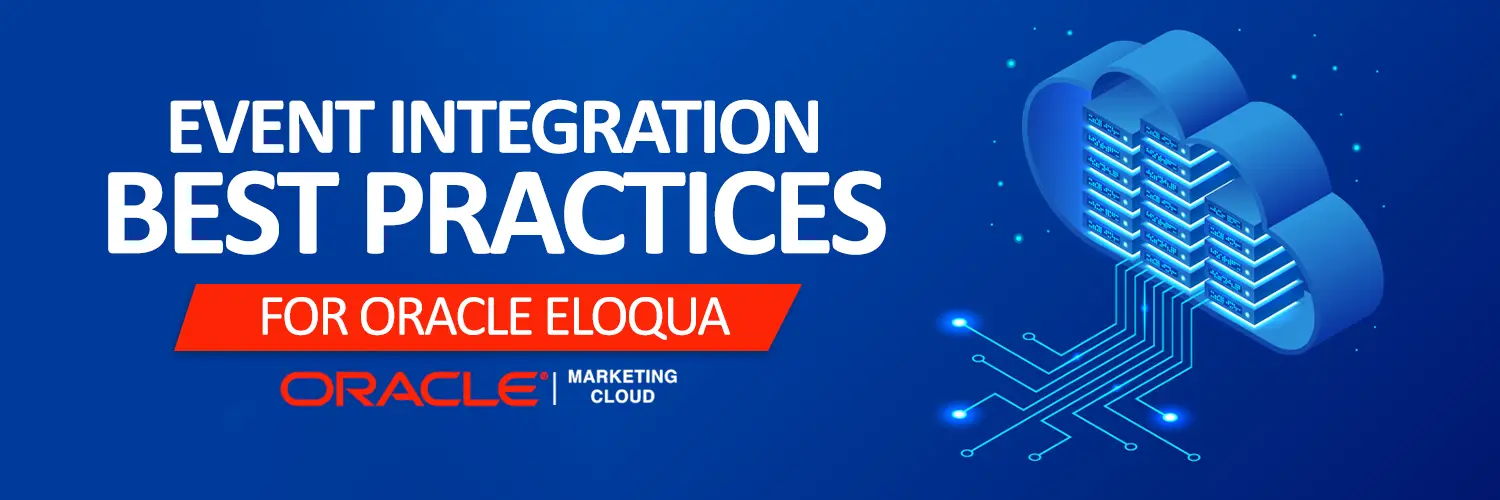
Event Integration Best Practices for Oracle Eloqua
With the dramatic increase in online and virtual events in 2020, it’s more important than ever to have a well-designed integration between your event management platform(s) and Oracle Eloqua. Many meeting, webinar, and virtual event platforms offer native integrations to Oracle Eloqua. But that is typically where the hard work begins.
In today’s article, we’ll discuss some key questions and best practices we’ve used with our customers to ensure we meet all their requirements.
Making the Connection
When exploring an event management platform, a key consideration should be if they offer an out of the box (OOTB) Oracle Eloqua integration. Start by checking the vendors’ site for integrations, or try searching the Oracle Cloud Marketplace. The Marketplace may also include listings for 3rd party integrations. And if a third-party solution isn’t available in the Oracle marketplace, integration platforms like Zapier are also available. Integration platforms may require a bit more planning and configuration. Also, they may not support every data element you hoped for, but it may be sufficient for what you need.
Depending on your integration, your solution may offer built-in data mapping tools. These tools are similar to field mapping tools in Eloqua for list uploads. But not all integrations are customer-configurable. For some, you must provide a list of fields and data types to the vendor, and they set up the configuration for you.
Data and Process Mapping
Once you’ve decided how to connect your systems, the next step is to explore the data available through the integration and how it maps to Eloqua. Before we go further, it’s critical to consider the big picture. While Eloqua may be the tool that connects and receives event data, very often, it’s not the only destination. Eloqua may store the data as is, or it may perform operations and transform the data, and then pass it to your CRM or other systems. Take time to understand the data, how it maps to Eloqua and other systems. If you have one, refer to your Data Dictionary, it should contain details on fields, formats, usage, and history.
Required and Optional Data Elements
Event data drives segmentation, lead nurturing, and other sales and marketing processes. Many integrations offer an extensive list of data elements available from the event platform. However, it’s essential to evaluate each data point and determine if it’s necessary or is merely informative. Required elements may include but are not limited to contact and company details, consent, event details such as event name, event id, campaign id, area of interest, and if they registered or attended.
Other elements may be useful, but you need to evaluate each based on how and who uses it. For example, you might consider data available for the total event duration; time watched, Q&A questions asked, and their answers as useful but informative. In this case, and your sales team wants this information added to a lead, you could combine them into a single text field and store it as a note in your CRM. If a savvy salesperson reads the note, they’ll learn their customer or prospect attended the widget webinar and during the Q&A asked if widgets work with sprockets. That information may be a great reason to follow-up and sell them more sprockets. Bring this topic up in your next meeting with sales, train them on the data they should look for, and where to find it in the CRM.
Campaign Association and External Activities
Many platforms offer fields to enable campaign attribution for events. You simply need to configure it once, and all records should include a value for campaign id. If you create external activities for your events, the data is available for automated lead scoring. Someone who registers and attends or watches a replay could receive a higher score than someone who just registered. Some platforms offer an attendee score, which may be useful in your lead scoring model. It’s another data point to consider.
4Thought marketing offers the Campaign Membership Cloud App, which streamlines the process of creating campaign associations and external activities automatically.
Importance of Nurture Campaigns
While your goal when hosting events is to generate new sales leads, not everyone who registers and attends qualifies as a lead. A critical part of your event strategy should be a nurture foundation and topic-specific nurturing campaigns. While your event may provide almost everything the lead wanted, it may not be sufficient for them to MQL. Nurtures continue the conversation automatically, providing additional details to help the customer as they evaluate your product.
Conclusion
Companies are increasingly marketing and promoting their products and services through virtual events and meetings, which demands quality integration between your event platform and Oracle Eloqua. Many of these platforms directly support Oracle Eloqua. At the same time, some are available through 3rd party integration or via general-purpose integration platforms. Connecting systems is just the start. Mapping the data to your existing internal processes and data formats is vital. And don’t forget to leverage campaign associations to track effectiveness. And finally, support your virtual events and meetings with nurtures that further qualify leads until they MQL.
Contact Us if you need help with your event integration. We’ve helped countless customers build robust event integration solutions that drive results.





